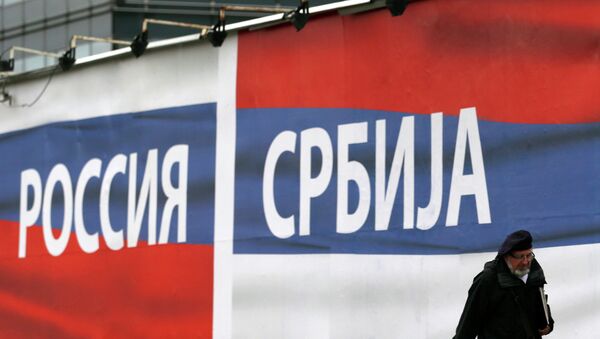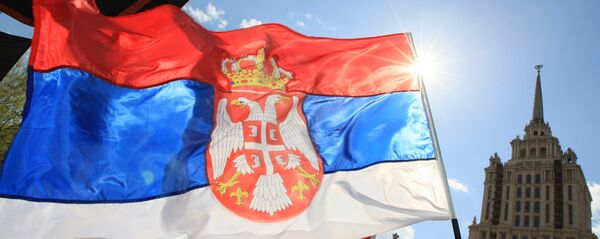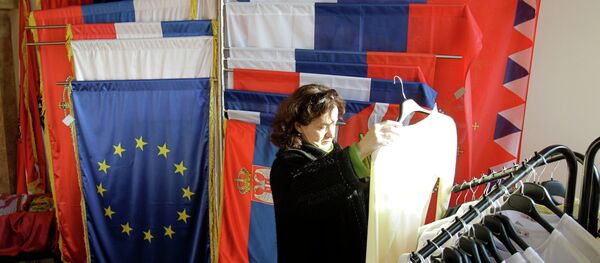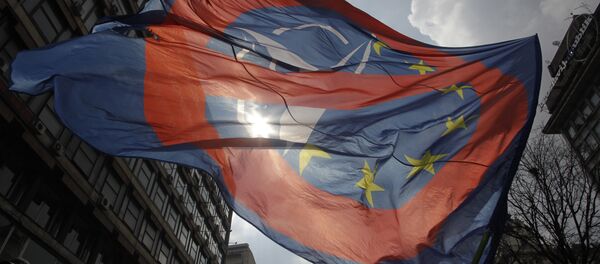European Parliament rapporteur for Serbia David McAllister warned Belgrade Thursday that Serbia's intention to maintain close relations with Russia would not be tolerated by Brussels in the long run.
"The European Parliament sent a signal to Serbia through its [January] resolution that a dual approach to Russia could not be tolerated in the long run," McAllister said at the press conference in Belgrade dubbed "The European Union's Global Strategy on Foreign and Security Policy and the Western Balkans," as quoted by Balkan Insight.
Ahead of the conference McAllister clarified his position in an interview with Europe Western Balkans media outlet.
"The Serbia-Russia relations have often been debated. Serbia has traditionally strong economic, social and cultural ties with Russia," he admitted.
However, he claimed that since Russia "unilaterally changes European borders" and tries to "expand its influence" over its neighbors, Belgrade "needs to make strong efforts in aligning its foreign and security policy to that of the EU, including the policy on Russia," referring to the EU sanctions regime imposed on Moscow.
Much in the same vein Nathalie Tocci, adviser to EU Foreign Policy and Security Chief Federica Mogherini, described Serbia's prospects for EU membership in her interview with Tanjug.rs:
Nevertheless, the Serbian government does not want to abandon its ties with Moscow, insisting that it intends to maintain fruitful diplomatic relations with both Russia and the West.
"I…wish to underline that in the process of decision-making Serbia had a continued consistent stance that at this very stage of the accession process it could not uphold all EU decisions. In some cases Serbia did not align with the EU positions, respecting its national interest concerning the issue of preserving its territorial integrity and the need to maintain traditionally good relations with other partners as well, first and foremost with Russia and China," Foreign Minister Ivica Dacic told the press conference on Thursday.
At the conference Dacic underscored that the time has come to reexamine what was done to Serbia back in 1999, and threw into question Kosovo's self-proclaimed sovereignty. He recalled that US Assistant Secretary of State told him that the US has been investing in Kosovo's independence for 20 years.
"Then I think the mistakes must be sought not only in our system," he stressed, as cited by B92.net.
He emphasized that neither Russia nor China recognize Kosovo's independence.
Later, commenting on the EU officials' remarks Dacic told Serbian daily newspaper Novosti, as cited by Balkan Insight: "It could not be expected from Serbia to introduce sanctions on its friends."
In his interview with Sputnik former Serbian diplomat Zoran Milivojevic noted that Serbia has its own national interests and the right to protect them.
"There are no reasons [for Serbia] to reconsider its relation with other nations, especially with United Nations Security Council permanent members and traditional friends of Serbia, Russia or China," Milivojevic told Sputnik.
The diplomat stressed that it is inappropriate for Brussels to set such conditions on the very early phases of Serbia-EU negotiations, referring to the fact that Belgrade and the EU are yet to discuss the 31st chapter of EU accession related to Serbia's foreign policy. Only when the chapter is opened the issue of the Russo-Serbian should be brought into the spotlight, he stressed.




